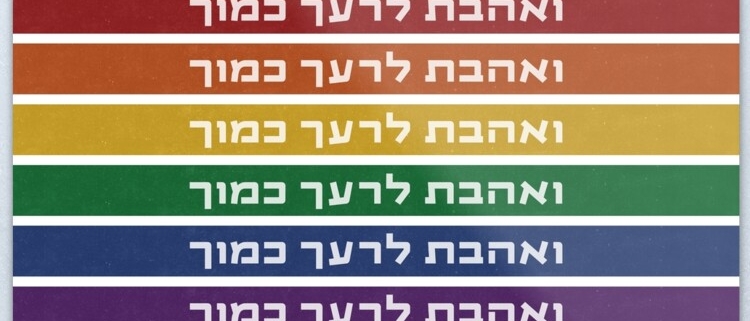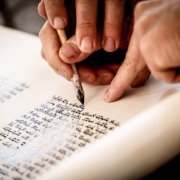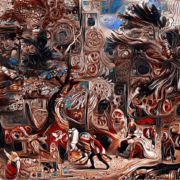Counting on LGBT+ Jews for Shavuot
 The Torah was never given to an individual, but rather to a nation. For far too long, many communities have forced those who come out – to get out, and as a result, we, and the Torah we study, are deficient. Our rabbis teach that if we want to properly accept the Torah on Shavuot, we need to accept it as we originally did: with complete unity and acceptance of each other. That means that we must proactively engage our queer siblings and refocus our communal responsibility to ensure queer folks can be out – while staying in religious spaces.
The Torah was never given to an individual, but rather to a nation. For far too long, many communities have forced those who come out – to get out, and as a result, we, and the Torah we study, are deficient. Our rabbis teach that if we want to properly accept the Torah on Shavuot, we need to accept it as we originally did: with complete unity and acceptance of each other. That means that we must proactively engage our queer siblings and refocus our communal responsibility to ensure queer folks can be out – while staying in religious spaces.
It is perhaps for this reason that the Code of Jewish Law instructs us to read the Parsha of Bemidbar before Shavuot (Orach Chayim 428:4). Bemidbar begins with taking a census of the whole congregation of Israel “שְׂא֗וּ אֶת־רֹאשׁ֙ כּל־עֲדַ֣ת בְּנֵֽי־יִשְׂרָאֵ֔ל (Numbers 1:2). This was done by each person contributing a half shekel, which reminds us that by ourselves we are incomplete, and we need the other to be whole (R’ Shlomo Alkebetz).
Being gay or trans isn’t a choice; but being homo/transphobic is. Like we chose to accept the Torah, we must also choose to accept those to whom the Torah is given. Loving another, like we love ourselves (Leviticus 19:18), is an important principle of [obtaining] Torah (Toras Kohanim 4:12) and it takes a lot of effort to overcome the cultural norm of discrimination.
Loving people – אוֹהֵב אֶת הַבְּרִיּוֹת – is one of the 48 ways of acquiring Torah (Pirkei Avos 6:5) because through this love, one puts themselves back into into the collective and only then is one fitting to receive the Torah, which was given to the collective (Derech Chaim). The Maharal testifies to the opposite as well “If someone doesn’t love others, they are separating themselves from the klal and won’t merit Torah”. When we exclude others we are actually removing ourselves.
Shavuot is a celebration of acceptance, and Pride is no different. The absence of embracing is an act of severance. Like righteousness, inclusion is something that we must pursue – רדף. We run after that which we want to be one with. Not reaching out to folks that have been marginalized is an additional act of פרד – separation.
Our souls all have a shared source (see שער הגלגולים הקדמה יז), and in the spiritual world, there can be no interruption between them. Loving peace – שלום requires seeking out those who are in need of it, and healing the unnatural divisiveness that caused the lack of completion – שלם. It was only when we were like one person, with one heart, that G-d said “the time has come for Me to give the Torah” (Midrash Leviticus Rabbah 9:9).
Shir Hashirim Rabbah applies this dynamic today as well: “Anyone who isn’t a guarantor, and at one with the people to whom they are teaching Torah, shouldn’t teach them”. Midrash Tanchuma (Ki Tisa 16:2) takes it even further:
אָסוּר לְתַלְמִיד חָכָם לְהוֹרוֹת הֲלָכָה בַּצִּבּוּר, עַד שֶׁיְּהוּ דִּבְרֵי תּוֹרָה עֲרֵבִין עַל שׁוֹמְעֵיהֶם, כַּכַּלָּה הַזּוֹ שֶׁהִיא עֲרֵבָה עַל בַּעְלָהּ וּמִתְאַוֶּה לִהְיוֹת שׁוֹמֵעַ אֶת דְּבָרֶיהָ
It is forbidden for a Torah scholar to teach Jewish Law to a congregation until their words are pleasant and unified to those who are listening, like a bride whose words are desired by her partner.
A variation of this teaching explains the parable of a bride in the context of וַיִּתֵּן אֶל מֹשֶׁה כְּכַלֹּתוֹ – when we were given the Torah we were beloved as a bride. The sweetness that is achieved in our relationships with G-d, Torah, and people, is dependent on our closeness and understanding of the other. This is part of the blessing over the Torah that one makes every morning – והערב נא – born out of Moses’ love for the people (Tiferet Shlomo).
Shavuot is Zman Matan Torateinu – זְמַן מַתַּן תּורָתֵינוּ – the anniversary of our receiving G-d’s Torah. As we prepare to celebrate Shavuot, we must again make a choice – בחר: do we want to ally and attach ourselves to the klal – חבר, or will we be the ones running away – ברח – from our covenantal responsibility.

Rabbi Mike Moskowitz, a founding builder at Bayit and also a member of Bayit’s Board, serves as Scholar-in-Residence for Queer and Trans Jewish Studies at Congregation Beit Simchat Torah, a flagship LGBTQIA+ synagogue in New York City.
The art that illustrates this post is by Joanna Maria’s Judaica and is available here on redbubble. Please support independent artists!









